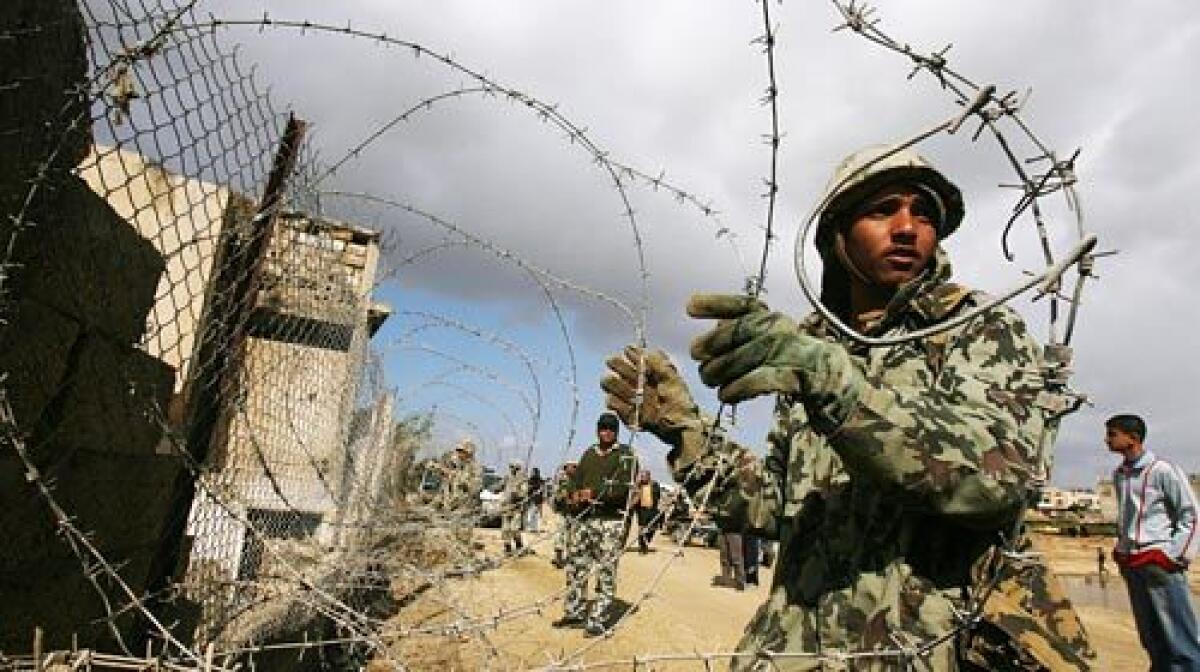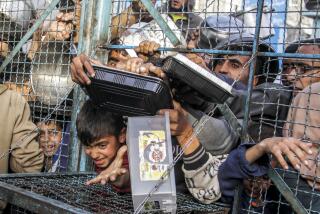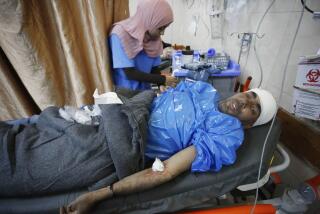Despite break, crisis builds in Gaza

Malah abu Lashin lay in the intensive care unit of Nasser Children’s Hospital here Sunday, her frail 20-month-old body attached to a ventilator, an oxygenator and an intravenous pump.
The lifeline that kept those devices functioning was equally fragile: a tenuous flow of electricity from a generator with just enough diesel in the tank to last 10 hours.
FOR THE RECORD:
Gaza electricity: A Section A article on Jan. 28 reported that Israelhad begun reducing the flow of electricity to the Gaza Strip after theIslamic movement Hamas seized full control of the territory in June.Although Israeli sanctions had caused electricity shortages bycurtailing supplies of diesel fuel to Gaza’s only power plant, Israeldid not reduce the amount of electricity it sells to Gaza until earlyFebruary. —
“If the power goes off, we can pump those machines by hand,” said Anwar Sheikh Khalil, the hospital’s director. “But we could not keep her alive that way indefinitely.”
Malah’s doctors are struggling to help her overcome a congenital muscular weakness and breathe on her own before Israel’s blockade of the Gaza Strip causes the lights to go out.
Gazans defied the blockade last week by toppling a border fence and pouring into Egypt to shop. But vital public services -- including medical care, electricity, water supply and sewage treatment -- remain severely crippled by Israeli sanctions, according to Palestinian officials and international relief agencies.
Israeli Prime Minister Ehud Olmert, repeating an assurance made last week, told Palestinian leaders Sunday that he would not allow a humanitarian crisis to develop.
But Palestinian health officials and foreign relief workers say Gaza is already in crisis. They say shortages of some items, particularly medicines, have become more acute in Gaza, since the border breach Wednesday prompted Israel to halt the limited shipments it had been allowing.
Mahmoud Daher, a World Health Organization officer in Gaza, said 105 essential medicines were no longer available in Gaza, including drugs needed by 135 hospitalized cancer patients.
At the Nasser hospital, doctors said eight premature babies had died in the last two weeks, including one who needed blood-clotting agents that they didn’t have -- a tragedy obscured by the televised scenes of jubilant Gazans swarming past Egyptian guards at the Rafah border post.
“After feeling imprisoned for so long, it has been a psychological relief for Gazans to know that there is a way out,” said John Ging, head of the U.N. Relief Works Agency office here. “But it does not resolve their crisis by any stretch of the imagination.”
The euphoria had begun to wear off Sunday. Food and other consumer goods grew scarce in markets in the Egyptian Sinai, depleted by hundreds of thousands of Palestinians. More Gazans were returning home Sunday than crossing into Egypt.
Familiar hardships awaited them in the impoverished coastal enclave.
With Egypt’s cooperation, Israel began reducing the flow of electricity, fuel, commerce and travelers across Gaza’s borders after the militant Islamic movement Hamas, which had won parliamentary elections in 2006, seized full control of the territory in June. Israel and the United States list Hamas, which advocates Israel’s destruction, as a terrorist organization.
Israel sealed the borders completely Jan. 17 in retaliation for a sharp increase in the rocket attacks from Gaza that have wounded 82 Israeli civilians in the last six months. Bowing to international criticism, Israel eased the blockade slightly Tuesday but restricted supplies again after the border breach.
Gaza’s only electricity plant, which serves Gaza City, has instituted rotating power cuts that last as long as 12 hours to conserve reduced shipments of industrial diesel fuel from Israel.
According to a United Nations report, fuel cuts have disabled water pumping stations, depriving 40% of Gaza’s people of running water, and waste treatment plants, forcing them to dump nearly 8 million gallons of untreated sewage a day into the Mediterranean.
Power cuts also pose a deadly threat because engineers cannot keep electricity flowing only to hospitals while other parts of the power grid are blacked out. To keep 20 children alive in incubators at the Nasser hospital, Khalil said he rations generator power during the daily blackouts by closing two nonemergency wards.
“There is barely enough fuel for just one of my two generators,” the hospital director said. “Every day, we operate on the edge of catastrophe.”
Olmert conceded last week that the Israeli cutbacks are intended to make life “uncomfortable” for civilians in Gaza as long as Hamas permits the rocket attacks. At the same time, Israeli officials insist that Palestinians are exaggerating the shortages to mobilize international pressure on Israel.
The issue came before Israel’s Supreme Court as it heard an appeal Sunday by Israeli human rights groups for an injunction against the cut in fuel supply.
Rafik Maliha, the Gaza power plant’s project manager, said he prepared testimony for the court that Israel’s promise to deliver 580,000 gallons of diesel fuel to the power plant each week would leave it operating well below its 80 megawatt capacity, and without reserves.
But Israeli border police delayed Maliha and another Palestinian power company official for four hours at a border crossing, and they missed the hearing.
“The state of Israel is trying to cover up a power crisis by preventing the court from looking into the details,” said Sari Bashi, director of the Gisha human rights group, which is petitioning the court.
Some Israeli officials are eager to ditch responsibility for Gaza, from which Israel withdrew its settlers and military bases in 2005. As Gazans poured into Egypt, Israel stopped allowing U.N. and other international agencies to ship about 120 truckloads of food and medicine to Gaza each day.
Israeli officials argued that Egypt was now meeting Gazans’ humanitarian needs by allowing them to shop. The Egyptian side of the border turned into an open-air bazaar offering goods as diverse as garlic, motorcycles, cement and sheep.
Rami Abdou, a financial analyst here, estimated that 600,000 of Gaza’s 1.5 million people shopped in Egypt and spent $150 million in four days, many of them tapping their savings or borrowing. Larger commercial transactions added $55 million in sales, Abdou said. His estimate was based on a survey of 1,112 shoppers by Gaza’s independent Mustaqbal Center.
But the sudden influx of consumer goods did little, he and other analysts said, to relieve Gaza’s pressing needs for energy, medical care and other vital services. They said the food bought in Egypt was a fraction of what relief agencies are now barred from delivering from Israel to roughly 1 million needy Gazans.
Egyptian volunteer associations have sent truckloads of medical supplies. But Bassam Naim, Gaza’s health minister, said the shipments were not well coordinated with his office and lacked cancer drugs, vaccinations, hypertension medication and many other needed items.
By Friday, Egyptian police were stopping Gaza-bound relief trucks, stranding 20 with medical supplies a few hundred yards from the border.
Noha El-Hennawy of The Times’ Cairo Bureau contributed to this report.
More to Read
Start your day right
Sign up for Essential California for news, features and recommendations from the L.A. Times and beyond in your inbox six days a week.
You may occasionally receive promotional content from the Los Angeles Times.





